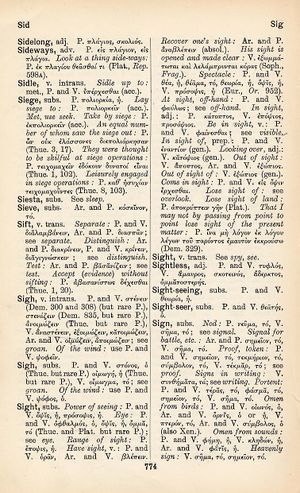sight
Ῥᾷον παραινεῖν ἢ παθόντα καρτερεῖν → Patientiam suadere facile, non pati → Es spricht sich leichter zu, als stark zu sein im Leid
English > Greek (Woodhouse)
subs.
Power of seeing: P. and V. ὄψις, ἡ, πρόσοψις, ἡ.
Eye: P. and V. ὀφθαλμός, ὁ, ὄψις, ἡ. ὄμμα, τό (Thuc. and Plat. but rare P.); see eye.
Range of sight: P. ἔποψις, ἡ.
Have sight, v.: P. and V. ὁρᾶν, Ar. and V. βλέπειν.
Recover one's sight: Ar. and P. ἀναβλέπειν (absol.).
His sight is opened and male clear: V. ἐξωμμάτωται καὶ λελάμπρυνται κόρας (Soph., Frag.).
Spectacle: P. and V. θέα, ἡ, θέαμα, τό, θεωρία, ἡ, ὄψις, ἡ, V. πρόσοψις, ἡ (Eur., Or. 952).
At sight, off-hand: P. and V. φαύλως; see off-hand.
In sight, adj.: P. κάτοπτος, V. ἐπόψιος, προσόψιος.
Be in sight, v.: P. and V. φαίνεσθαι; see visible.
In sight of, prep.: P. and V. ἐναντίον (gen.).
Looking over, adj.: V. κατόψιος (gen.).
Out of sight: V. ἄποπτος, Ar. and V. ἐξώπιος. V. ἐξώπιος (gen.).
Come in sight: P. and V. εἰς ὄψιν ἔρχεσθαι.
Lose sight of: see overlook.
Lose sight of land: P. ἀποκρύπτειν γῆν (Plat.).
That I may not by passing from point to point lose sight of the present matter: P. ἵνα μὴ λόγον ἐκ λόγου λέγων τοῦ παρόντος ἐμαυτὸν ἐκκρούσω (Dem. 329).
v. trans.

